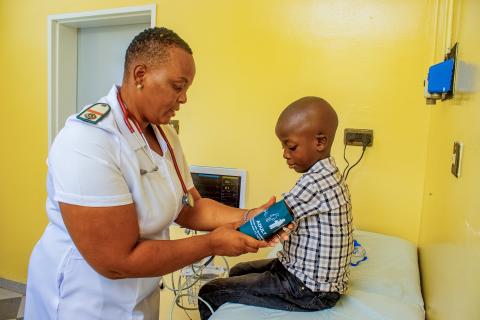Basic
A tragic loss and a second chance: On World Sickle Cell Day (19th of June), Sarah and Lisa's story highlights how crucial well-trained healthcare professionals are for the early and effective treatment of sickle cell disease.
Content
Content Text
When Sarah Mutende lost her infant son to what she later suspected was undiagnosed sickle cell disease (SCD), it was a tragedy rooted in a lack of knowledge. At the time, the local clinic lacked both the tools and knowledge to recognise the warning signs — swollen legs, high fevers, and fatigue. Without knowing what to test for, the health workers sent the baby home without treatment. Before his first birthday, he had passed away.
Content Media
Content Text
Years later, when her daughter Lisa began showing similar symptoms at just four months old, Sarah didn’t take any chances. In April 2024, she went straight to Butere Hospital, where she met the team from DAMKA, a local partner organisation working closely with SolidarMed to improve care for children with sickle cell disease.
This time, the story was different: Thanks to early screening and a proper diagnosis using the recommended HB Electrophoresis test, Lisa received immediate treatment and was enrolled in DAMKA’s programme. She now receives essential medication like Hydroxyurea and Pen-V at a subsidised cost and most importantly, she’s thriving.
Content Text
About Sickle Cell Disease
Sickle cell disease is a chronic, inherited blood disorder. It affects the shape of red blood cells, causing them to become rigid and crescent-shaped (like a sickle), which makes it harder for them to carry oxygen and flow through blood vessels. This can lead to severe pain, infections, organ damage, and life-threatening complications. In regions where malaria is common, sickle cell disease occurs more frequently because the genetic mutation offers protection against malaria and has therefore persisted through evolution.
In most cases, SCD cannot be cured, but its symptoms and complications can be managed with ongoing treatment and care.
Content Text
Since that tragic loss at Manyala Hospital, DAMKA has trained two healthcare workers in how to screen for, diagnose and manage sickle cell disease. In February 2025, the organisation launched a dedicated SCD clinic, offering regular care every first Tuesday of the month.
On Sickle Cell Awareness Day, this story is a powerful reminder: Early diagnosis, access to treatment, and well-trained health workers save lives. Together with partners like DAMKA, SolidarMed is strengthening local health systems to prevent avoidable deaths and enabling a healthy future for children like Lisa.
Content Text
SolidarMed improves access to and the quality of medical care for diabetes, high blood pressure, oral health and other non-communicable diseases. Read more.
Teaser Spenden
Many children with sickle cell disease still go undiagnosed. Help ensure that no child has to die from a treatable disease.
